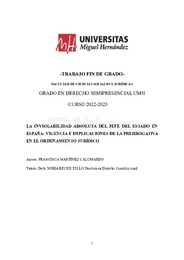Por favor, use este identificador para citar o enlazar este ítem:
https://hdl.handle.net/11000/30239Registro completo de metadatos
| Campo DC | Valor | Lengua/Idioma |
|---|---|---|
| dc.contributor.advisor | Reche Tello, Nuria | - |
| dc.contributor.author | Martínez Calomardo, Francisca | - |
| dc.contributor.other | Departamentos de la UMH::Ciencia Jurídica | es_ES |
| dc.date.accessioned | 2023-11-22T08:50:41Z | - |
| dc.date.available | 2023-11-22T08:50:41Z | - |
| dc.date.created | 2023-06 | - |
| dc.identifier.uri | https://hdl.handle.net/11000/30239 | - |
| dc.description.abstract | El presente trabajo se propone examinar de manera crítica, la anacrónica situación que supone mantener la vigencia de la prerrogativa de inviolabilidad absoluta del jefe del Estado en el ordenamiento jurídico español ya que ello puede significar la impunidad de quien la ostenta ante comportamientos jurídicamente reprochables en un Estado de Derecho hoy día. Aunque estas prerrogativas son comunes en otros países donde rige la monarquía parlamentaria como forma política del Estado, en ellos se ha podido observar trazas de adaptabilidad del estatuto jurídico de sus jefes de Estado a los nuevos valores de igualdad y justicia imperantes en la sociedad, impidiendo que el mantenimiento de la prerrogativa real se convierta en un lastre para el Estado y produzca situaciones arbitrarias inaceptables en el ámbito político, jurídico y social. A lo largo del trabajo se formularán diversas razones sobre la procedencia de limitar o eliminar dicha prerrogativa del ordenamiento jurídico y se aportarán algunas propuestas para ello. Por último, se expondrán las conclusiones a las que se ha podido llegar tras el estudio llevado a cabo. | es_ES |
| dc.description.abstract | This paper aims to examine critically the anachronistic situation of maintaining the validity of the prerogative of absolute inviolability of the head of state in the Spanish legal system, specially in a State of law, since this can mean impunity for the holder of the prerogative in case of committing legally reprehensible acts. Although these prerogatives are common in other parliamentary monarchies, in them it has been possible to observe traces of adaptability of the legal status of their heads of State to the new values of equality and justice prevailing in society, preventing the maintenance of the royal prerogative from becoming a burden for the State and producing unacceptable arbitrary situations in the political, legal and social spheres. Throughout the work, different reasons will be formulated about the convenience of limiting or eliminating this prerogative of the legal system and some proposals will be provided for this. Finally, conclusions reached after the study carried out will be presented. | es_ES |
| dc.format | application/pdf | es_ES |
| dc.format.extent | 47 | es_ES |
| dc.language.iso | spa | es_ES |
| dc.publisher | Universidad Miguel Hernández de Elche | es_ES |
| dc.rights | info:eu-repo/semantics/openAccess | es_ES |
| dc.rights | Attribution-NonCommercial-NoDerivatives 4.0 Internacional | * |
| dc.rights.uri | http://creativecommons.org/licenses/by-nc-nd/4.0/ | * |
| dc.subject | monarquía parlamentaria | es_ES |
| dc.subject | inviolabilidad absoluta | es_ES |
| dc.subject | anacronismo | es_ES |
| dc.subject | impunidad | es_ES |
| dc.subject | parliamentary monarchy | es_ES |
| dc.subject | absolute inviolability | es_ES |
| dc.subject | anachronism | es_ES |
| dc.subject | impunity | es_ES |
| dc.subject.other | CDU::3 - Ciencias sociales::34 - Derecho | es_ES |
| dc.title | La inviolabilidad absoluta del Jefe del Estado en España: Vigencia e implicaciones de la prerrogativa en el ordenamiento jurídico | es_ES |
| dc.type | info:eu-repo/semantics/bachelorThesis | es_ES |

Ver/Abrir:
Martínez Calomardo Francisca.pdf
1,09 MB
Adobe PDF
Compartir:
 La licencia se describe como: Atribución-NonComercial-NoDerivada 4.0 Internacional.
La licencia se describe como: Atribución-NonComercial-NoDerivada 4.0 Internacional.
.png)